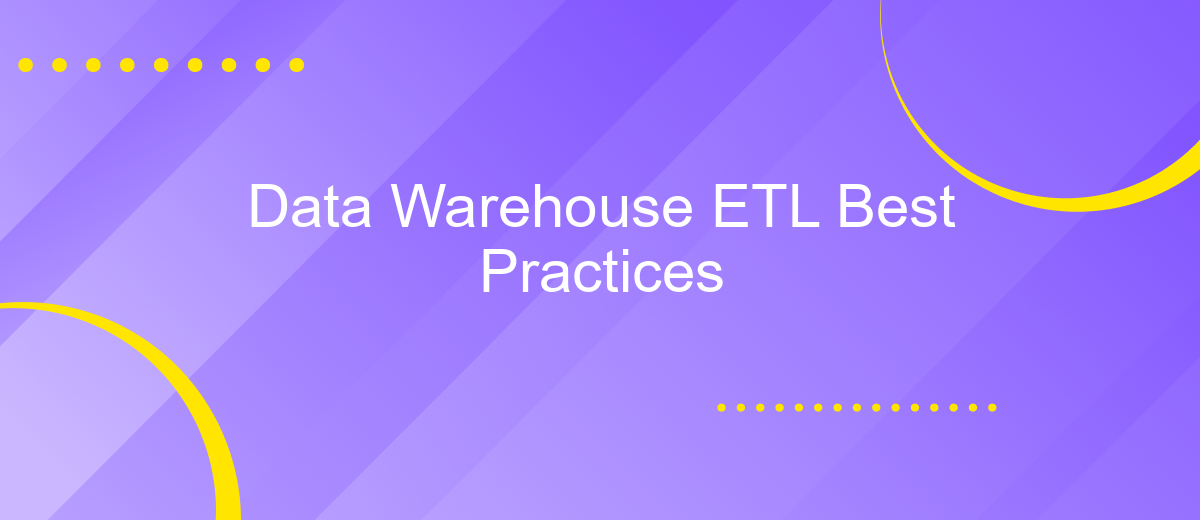Data Warehouse ETL Best Practices
In the ever-evolving landscape of data management, effective ETL (Extract, Transform, Load) processes are crucial for maintaining a robust data warehouse. This article explores best practices for optimizing ETL workflows, ensuring data integrity, and enhancing performance. By following these guidelines, organizations can streamline their data operations, reduce errors, and make more informed business decisions.
Data Integration
Data integration is a crucial aspect of any Data Warehouse ETL process. It involves consolidating data from multiple sources into a unified view, ensuring consistency and accuracy. Effective data integration can significantly enhance decision-making processes by providing a comprehensive picture of the business landscape.
- Ensure data consistency across all sources.
- Utilize ETL tools for seamless data extraction, transformation, and loading.
- Implement robust data validation and cleansing mechanisms.
- Leverage automated data integration services like ApiX-Drive for efficiency.
- Monitor and maintain data integration workflows regularly.
Automated services such as ApiX-Drive can greatly simplify the data integration process by allowing seamless connections between various data sources and your data warehouse. By automating routine tasks, these tools help maintain data integrity and reduce the risk of errors. This not only saves time but also ensures that your data warehouse is always up-to-date with the latest information.
Data Transformation

Data transformation is a critical phase in the ETL process, involving the conversion of raw data into a format suitable for analysis. This step includes data cleaning, normalization, and enrichment to ensure consistency and accuracy. Effective transformation practices involve using robust tools and methodologies to automate and streamline the process, reducing manual intervention and minimizing errors. Leveraging scripting languages like Python or specialized ETL tools can enhance efficiency and scalability.
Integrating third-party services, such as ApiX-Drive, can further optimize data transformation. ApiX-Drive enables seamless integration with various data sources and applications, automating data flows and ensuring real-time updates. This service supports a wide range of connectors, making it easier to transform data from disparate systems into a unified format. By utilizing such integrations, organizations can maintain data integrity and enhance the overall performance of their data warehouse.
Data Loading

Data loading is a crucial step in the ETL process, as it ensures that the transformed data is accurately and efficiently transferred to the data warehouse. Effective data loading practices can significantly enhance the performance and reliability of your data warehouse, ensuring that it meets business requirements and service level agreements (SLAs).
- Ensure data consistency by validating data before loading it into the data warehouse.
- Optimize loading performance by using bulk loading techniques where possible.
- Monitor and log data loading processes to identify and resolve any issues promptly.
- Utilize incremental loading strategies to minimize the impact on system resources.
- Leverage data integration tools like ApiX-Drive to automate and streamline the loading process.
By following these best practices, organizations can achieve efficient and reliable data loading, which is essential for maintaining the integrity and performance of the data warehouse. Tools like ApiX-Drive can further enhance this process by providing seamless integrations and automation capabilities, reducing manual intervention and potential errors.
Data Quality

Ensuring data quality is paramount in any Data Warehouse ETL process. High-quality data is essential for making accurate business decisions and maintaining the integrity of your analytics. Poor data quality can lead to erroneous insights, which can have significant negative impacts on business operations.
To maintain data quality, it is crucial to implement robust validation and cleansing processes. These processes should be automated as much as possible to reduce human error and increase efficiency. Tools like ApiX-Drive can be instrumental in setting up seamless integrations that ensure data consistency across different systems.
- Implement data validation checks at every stage of the ETL process.
- Regularly cleanse and standardize data to eliminate duplicates and inconsistencies.
- Use automated tools for monitoring data quality and generating alerts for anomalies.
- Ensure that data governance policies are in place and strictly followed.
By adhering to these best practices, you can significantly enhance the quality of your data. This, in turn, will lead to more reliable analytics and better-informed business decisions. Investing in data quality is not just a technical necessity but a strategic advantage.
- Automate the work of an online store or landing
- Empower through integration
- Don't spend money on programmers and integrators
- Save time by automating routine tasks
Performance Optimization
Optimizing performance in a Data Warehouse ETL process is crucial for ensuring efficient data handling and timely analytics. One of the primary strategies is to streamline data extraction, transformation, and loading by minimizing data movement and leveraging incremental data loads. This reduces the volume of data processed and enhances speed. Additionally, employing parallel processing techniques can significantly decrease ETL runtime by distributing tasks across multiple processors or nodes, thereby maximizing resource utilization.
Another effective practice is to optimize SQL queries and database indexing, which can drastically improve data retrieval times. Monitoring and tuning these queries regularly helps in identifying bottlenecks and optimizing execution plans. Integrating services such as ApiX-Drive can further enhance performance by automating data workflows and ensuring seamless integration between various data sources and destinations. This reduces manual intervention and potential errors, leading to a more efficient and reliable ETL process.
FAQ
What is ETL in the context of a Data Warehouse?
Why is data quality important in the ETL process?
How often should ETL processes be run?
What are some best practices for ETL performance optimization?
How can automation tools help in the ETL process?
Time is the most valuable resource for business today. Almost half of it is wasted on routine tasks. Your employees are constantly forced to perform monotonous tasks that are difficult to classify as important and specialized. You can leave everything as it is by hiring additional employees, or you can automate most of the business processes using the ApiX-Drive online connector to get rid of unnecessary time and money expenses once and for all. The choice is yours!


